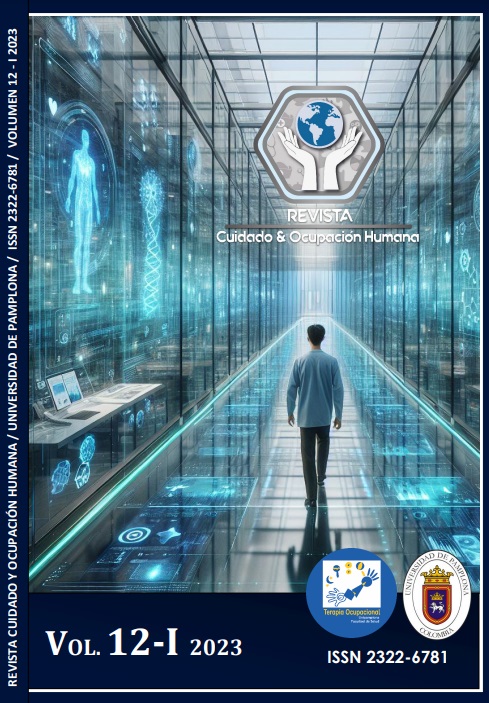Socio-affective development and its influence on school performance in primary school: an occupational therapy perspective
DOI:
https://doi.org/10.24054/coh.v12i1.3084Keywords:
Development, Academic performance, Socio-affective, Skills, Emotions, Affective relationships, Childhood, Primary, Strategies, Occupational TherapyAbstract
Objetive: Socio-affective development has been an area of research interest in the area of health, which is why different researchers have dedicated efforts to understanding its impact on the academic performance and well-being of children. In this review, multiple articles have been analyzed that have concluded that this aspect not only affects school performance, but also the experience and integrity of students.
Taking the above into account, it addresses the interrelationship between the impact of socio-affective development in childhood and its influence on academic performance, with a special focus on the role of Occupational Therapy in the school environment. To understand this phenomenon, it is essential to define the concept of socio-affective development, which includes the ability to manage emotions and establish positive relationships.
According to Piaget (1982), the development of social skills begins with the child's first interactions with his environment. These skills, according to the review carried out, are essential for their social adaptation and comprehensive development. Throughout the article it will be mentioned how occupational therapy can play a crucial role in strengthening these skills in the school environment, creating an environment conducive to optimal learning and development of students.
Downloads
References
Y., Rugerio Tapia, J. P., Hermosillo García, Á. M., & Corona Guevara, L. A. (2020). Aprendizaje socioemocional en preescolar: Fundamentos, revisión de investigaciones y propuestas. *Revista Electrónica de Investigación Educativa, 22*, e26. Epub 02 de marzo de 2021. https://doi.org/10.24320/redie.2020.22.e26.2897
Huang, C., & Zeng, X. (2023). Social and emotional development of disadvantaged students and its relationship with academic performance: Evidence from China. *Frontiers in Psychology, 14*, 1170656. https://doi.org/10.3389/fpsyg.2023.1170656
Livingstone, S. (2017). *Los niños en la era digital*. Barcelona: Gedisa.
Marcelo, C. (2007). *La formación del profesorado para el siglo XXI*. Madrid: Morata.
Márquez Allauca, V. M., Reyes Vargas, R. M., Merchán Gavilánez, M. L., & Valle Gavilanes, D. D. R. (2021). Competencias parentales en el desarrollo socioafectivo en niñas y niños de 3 a 5 años. *Análisis del comportamiento de las líneas de crédito a través de la Corporación Financiera Nacional y su aporte al desarrollo de las PYMES en Guayaquil 2011-2015, 5*(3), 182–195. https://doi.org/10.26820/reciamuc/5.(3).agosto.2021.182-195
Martín, M. L., Contini, E. N., & Lacunza, A. B. (2021). Acerca del autoconcepto en adolescentes de escuelas secundarias. Un análisis en contextos vulnerables. *Cuadernos de la Facultad de Humanidades y Ciencias Sociales. Universidad Nacional de Jujuy, (59)*, 251-274. Recuperado en 03 de marzo de 2024, de http://www.scielo.org.ar/scielo.php?script=sci_arttext&pid=S1668-81042021000100011&lng=es&tlng=es.
Moreno, E. M., Montero, A., & Armada-Crespo, J. M. (2024). Effectiveness of social-emotional development programs applied in primary education: An umbrella systematic review. *[Journal Name]*, *[Volume]*([Issue]), [Page Range]. [DOI or URL if available]
Ortiz Lack, L. G., & Gaeta González, M. L. (2019). Desarrollo socio-afectivo en la educación media superior: El papel del contexto académico. *Revista Panamericana de Pedagogía, 27*. https://doi.org/10.21555/rpp.v0i27.1680
Rojas Valladares, A. L., Estévez Pichs, M. A., & Macías Merizalde, A. M. (2019). La formación del docente de educación inicial, para estimular el desarrollo socio afectivo de los niños. *Revista Metropolitana de Ciencias Aplicadas, 2*(1), 51-57. Recuperado de http://remca.umet.edu.ec/index.php/remca
Robiansyah, M., & Rochmahwati, P. (2020). Socio-affective strategies employed by students in speaking class. *ELTALL, 1*(1), 9. https://doi.org/10.21154/eltall.v1i1.2097
Shaffer, D. R. (2005). *Psicología del desarrollo: Infancia y adolescencia*. México: Thomson Learning.
Suárez Cretton, X., & Castro Méndez, N. (2022). Competencias socioemocionales y resiliencia de estudiantes de escuelas vulnerables y su relación con el rendimiento académico. *Revista de Psicología, 40*(2), 879–904. https://doi.org/10.18800/psico.202202.009
Valarezo Encalada, C. M., Celi Rojas, S. Z., Rodríguez Guerrero, D. B., & Sánchez Gahona, V. C. (2020). Caracterización general y evolución de la personalidad en la primera infancia. *Horizontes Revista de Investigación en Ciencias de la Educación, 4*(16), 469–482. http://www.scielo.org.bo/scielo.php?pid=S2616-79642020000400010&script=sci_arttext
Vista de estrategias didácticas para el fortalecimiento socioafectivo de los estudiantes de preescolar de la Institución Educativa Rodolfo Castro Castro. (s/f). Edu.co. Recuperado el 8 de marzo de 2024, de https://revistas.umariana.edu.co/index.php/unimar/article/view/2619/2893
Vista de estrategias socioafectivas en la educación básica regular. (s/f). *Revistahorizontes.org*. Recuperado el 8 de marzo de 2024, de https://revistahorizontes.org/index.php/revistahorizontes/article/view/833/1549
Vista de pedagogías libres y autorregulación emocional: Apuntes antiautoritarios sobre educación. (s/f). *Revistainnovaeducacion.com*. Recuperado el 8 de marzo de 2024, de https://revistainnovaeducacion.com/index.php/rie/article/view/201/238
¿Qué es el desarrollo socioafectivo? (s/f). Universidad Francisco de Vitoria Centro de Estudios Tecnológicos y Sociales. Recuperado de https://www.ufv.es/cetys/blog/que-es-el-desarrollo-socioafectivo/#:~:text=Es%20aqu%C3%AD%20cuando%20entra%20en,una%20manera%20correcta%20y%20sana.

